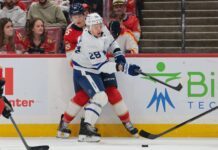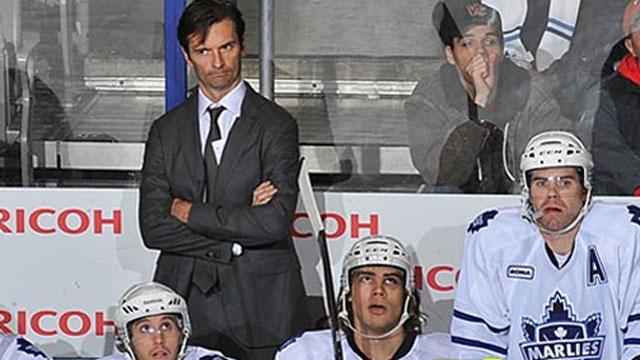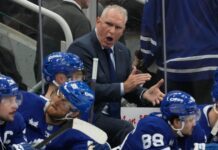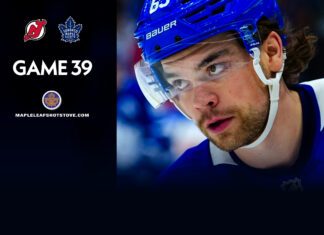Even though the Leafs haven’t played a hockey game in weeks and the Stanley Cup Finals are about to begin, there is no shortage of storylines surrounding the team right now. Let’s get to them.
Losing Eakins
After four years in which Dallas Eakins served as an assistant coach for the Leafs and Marlies, and after a year as the Leafs director of player development, Eakins became head coach of the Marlies in August of 2009. He took a team that finished with 90 points and lost out in the first round of the playoffs to last place in their division with 78 points a season later. In fairness to Eakins, the Marlies had lost their leading scorer from the year before – Tim Stapleton — as well as their other offensive leaders in Jiri Tlusty, Bates Battaglia and Jeremy Williams. In fact, the best way to sum up Eakins’ first year as the Marlies coach is by pointing out that Andre Devaux led the team in scoring.
The following season, however, the Marlies were led by Mike Zigomanis, a yo-yoing Nazem Kadri and Christian Hanson, Matt Lashoff, Joe Colborne and Fabian Brunnstrum (both acquired half way through the season) along with Ben Scrivens in net, yet they still missed the playoffs with 85 points as the Marlies once again finished last in their division.
That takes us to last season, when the Marlies went to the Calder Cup finals and were swept. They finished with 96 points and were led by Scrivens, Zigomanis, Ryan Hamilton, Greg Scott, Marcel Mueller and a host of young players such as Jerry D’Amigo.
This was Eakins’ first time in the playoffs with the Marlies and the Leafs sent down all their young guys to help the run. The team was aided by Kadri, Frattin, Colborne and Gardiner as the Marlies lost just two games total in their first three rounds. Generally speaking, when a team dominates their way to winning a conference it has more to do with the talent on the team than anything coaching or luck related. The Marlies were a stacked team from head to toe.
That brings us to this season, which started with a lockout. The Marlies had Aucoin, Kadri, Fraser, Kostka, Gardiner, Scrivens and Holzer head to the NHL once the lockout concluded. From there, the team eventually acquired Drew MacIntyre who went onto have a .931sv% and 1.83GAA as he basically carried the team. The Marlies won their division and swept Rochester in the first round again, but were ousted in the second round.
In summary, under Eakins the Marlies finished last twice and first twice in their division. Players that played for the Marlies and the Leafs or another NHL team under his reign include: Viktor Stalberg, Keith Aulie, Jonas Frogren, Troy Brodie, Jiri Tlusty, Tyler Bozak, Ryan Hamilton, Tim Brent, Christian Hanson, Luca Caputi, Darryl Boyce, Joey Crabb, Matt Lashoff, Joe Colborne, Carter Ashton, Korbinian Holzer, Mark Fraser, Colton Orr, Keith Aucoin, Mike Kostka, Jake Gardiner and Leo Komarov.
If you want to give Eakins credit for some of these guys contributing to NHL teams by all means do so, but most of them are marginal NHLers at best. Other than Kadri and Colborne, most of the successful bonafide NHL players passed right through the minors straight to the NHL – Stalberg, Bozak, Gardiner, etc. The Leafs also haven’t been a very good team over the years so there’s been a lot of roster spots up for grabs.
The truth is that we really don’t know how good of a coach Eakins is. The players definitely seem to like him, he represents the new wave of younger coaches coming through, and he’s achieved modest results, but that’s not enough to be too upset about losing him. Scott Arniel, Guy Boucher and Glen Gulutzan are examples of celebrated young coaches who spent time in the AHL before being hired by NHL clubs. All of them are unemployed at the moment.
Losing Eakins isn’t ideal, but the Leafs will be able to survive it. As we can all see right now, there are plenty of good coaches without work. Even if the Leafs do get rid of Carlyle sometime soon, there will be plenty of good options available to them.
The Marlies
The Marlies are now looking for a new coach, which is of more interest to me than Eakins leaving.
Dreger tweeted this yesterday:
The Marlies will be looking for a young coach who can grow with the club. Steve Spott? Ryan McGill? Glen Gulutzan?
— Darren Dreger (@DarrenDreger) June 8, 2013
It seems more Dreger is speculating more than anything, so I’m not going to breakdown those options one by one, but needless to say there are more than a few interesting coaching candidates for the job.
Of course, many will remember JFJ hiring Paul Maurice to coach the Marlies before promoting him to coach the Leafs. A similar situation could easily play out again.
Beyond that, the Leafs have two promising young coaches on their staff in Scott Gordon and Greg Cronin.
Gordon just turned 50 this year and already has nine years of head coaching pro hockey under his belt (One in the ECHL, six in the AHL and two in the NHL).
Greg Cronin spent five years as an assistant coach with the Islanders plus another two as head coach of their AHL team on top of his eight years coaching in college hockey.
By that token alone, it will be interesting to see if Nonis thinks one of those two associate coaches should get back to being a head coach in preparation of eventually becoming head coach of the Toronto Maple Leafs.
Losing Komarov
According to various reports, the Leafs appear to be losing Leo Komarov to the KHL. The first thing to note is that we don’t know if this is happening for sure. Even if he does sign a contract, we don’t know if there’s an out clause for a possible return. Speaking in certainties at this time would be foolish.
Assuming the Leafs do lose Komarov though, that would mean Toronto is now without two of their top four penalty killing forwards according to ice time, as it looks like Bozak is going to hit the open market at this point. The good news is that McClement and Kulemin are their two best penalty killing forwards, plus the core of the defense is returning and their best penalty killer James Reimer is still in the fold. Bozak and Komarov they might not be crucial losses to the unit, but they do open up holes that need to be filled.
Penalty kill aside, Komarov is really an ideal fourth liner more than anything. He can move up the line-up in a pinch, play all three forward positions, be a pest, get physical, and contribute some offense. Most importantly, he’s not a liability on the ice despite his limited ice time.
That limited ice time and role is most likely why he wants to go back to the KHL since he’ll play more and get paid more to do it.
For the Leafs, they have internal options to replace Komarov; it’s not a huge deal even though Komarov is a solid player and contributor. The most likely and seamless replacement is Jerry D’Amigo, who has featured on a shutdown line and penalty kill role for the Marlies for two straight years now. A season ago he had 41 points in 76 games before putting up 29 in 70 games this season. D’Amigo started the season way down the depth chart due to the lockout, but once the NHL started back up he got more ice time and played better. While D’Amigo is listed as bigger than Komarov (around 15 pounds heavier), he isn’t as physical, but he is faster. The Leafs also have Carter Ashton, who is much bigger than both at 6’3 but not as strong defensively.
Maybe the Leafs hope to add both Ashton and D’Amigo next fall, or maybe they will acquire someone to fill the role, but right now it looks like those two will at least be in the mix of competition for a low roster spot. It would be unfortunate to lose Komarov, but he’s not worth overpaying to keep on the fourth line and the Leafs will be able to move on just fine if he does leave.
Boston Lessons
There’s this growing sentiment in Toronto that, had the Leafs held onto beat the Bruins, they would be in the Stanley Cup Finals right now in Boston’s place.
None of us can possibly know if the Leafs would have beat the Rangers and Penguins. I’m not going to go down that path, but what is worth discussing is what the Bruins series has taught us.
The first thing is that we can’t make huge generalizations about the team based on seven games. There are things to learn from the seven games, but drastic decisions shouldn’t be made based exclusively around them.
The most notable and eye popping thing about the Leafs’ play against Boston compared to New York and Pittsburgh is how much faster the Leafs are than all three. Boston was generally able to shut down New York and Pittsburgh at will, but the Leafs speed put them on their heels and opened up scoring lanes and opportunities. For all that’s made about the Leafs lack of size and snarl in their top six, they are the only team that has really been able to create and produce against Boston and they did it by getting to the dirty areas no less.
It would be awesome if the Leafs could find a top line center to play with Kessel, but if not we know they can score against the best anyways.
Conversely, the Krejci line dominated the Leafs. However, they have been dominant throughout the Bruins’ entire playoff so it would be unfair to say the Leafs alone need a better shutdown unit.
If anything, the playoffs highlighted what we already knew throughout the season – the defense needs to be deeper. Even when the Leafs ran their best possible top 4 in Gunnarsson-Phaneuf and Gardiner-Franson, the workload was too much and they were noticeably out of gas in the third period of game 7. Phaneuf in particular looked completely done by the time Boston tied the game.
The Leafs don’t have a monster like Chara who can play half the game and dominate, so they need to make-up for that with defense by committee and that means they need to be strong one through six. The aforementioned four can be strong and Fraser too will be in the fold. Some sort of Marlie – be it Blacker, Holzer, Ranger or Rielly — will probably start as the seventh man, but the remaining defense spot has to be filled by a reliable player in order to spread out responsibilities and give the Leafs three strong pairings. As long as Gardiner and Franson continue to emerge, the Leafs are very close to having a strong overall unit on defense.
In net, Reimer gave the Leafs everything they could have hoped for. He stood on his head in games 5 and 6.
Other than another solid defenseman, the Leafs looked in need of another strong center – maybe that comes internally via Colborne — and a few more defensive-minded forwards. As we’ve noted, the Leafs didn’t have a huge issue scoring, and they have a number of players who are strong “two way” players like Kulemin, Grabovski, Frattin and JVR, but could use another defensive specialist.
Nonis doesn’t have to make huge changes, but a few savvy moves will have this Leafs team competitive and ready to go.















![John Gruden after the Leafs prospects’ 4-1 win over Montreal: “[Vyacheslav Peksa] looked really comfortable in the net… We wouldn’t have won without him” John Gruden, head coach of the Toronto Marlies](https://mapleleafshotstove.com/wp-content/uploads/2025/09/gruden-post-game-sep-14-218x150.jpg)




















